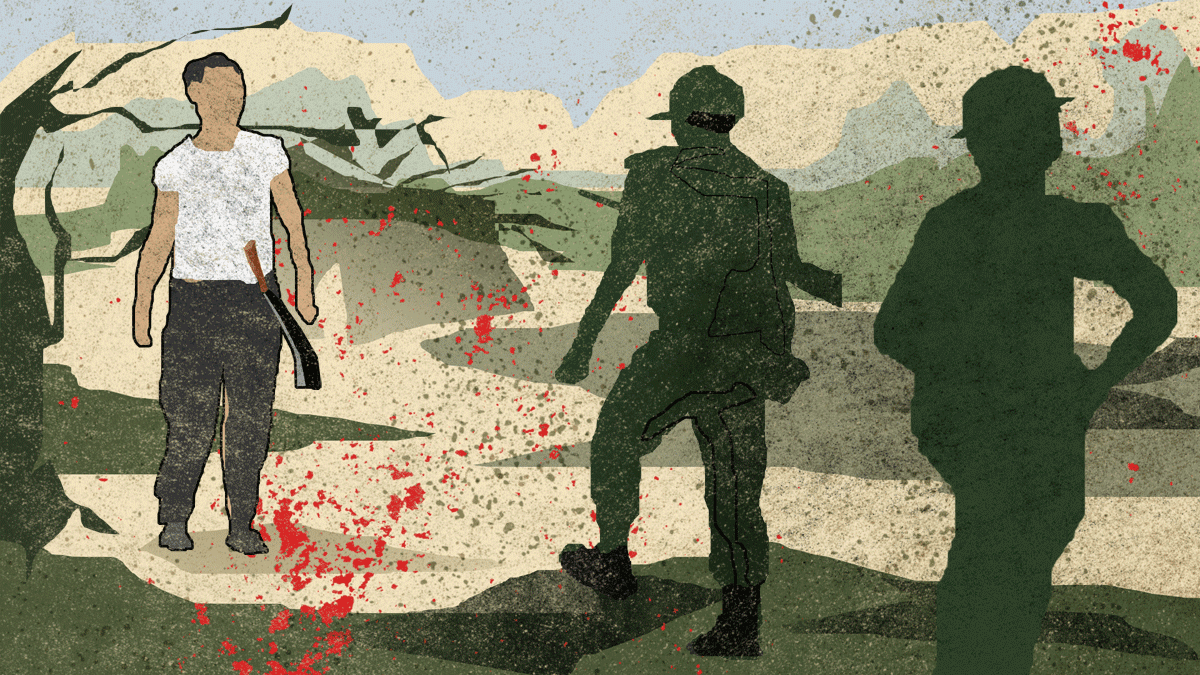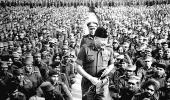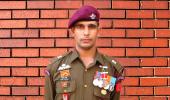All hell broke loose.
He knew the enemy was close.
Then he heard the deep-throated and comforting thudding as his LMG across the stream went into action.
Nanavatty was relieved that his men were in the fight with spirit.
A fascinating excerpt from Arjun Subramaniam's Shooting Straight: A Military Biography of Lt Gen Rostum K Nanavatty.

Describing the terrain in Nagaland as mesmerizing, beautiful to look at but a nightmare to negotiate, Nanavatty concurred with the assessment by men who had fought through it during World War II and described it as 'some of the most difficult terrain they had fought in.'
It was early March 1963. Nanavatty and his under-strength platoon had already done three patrols, familiarizing themselves with the terrain, the tracks, the villages and the Gaon Buras (village headmen) astride the ridgeline on which the company patrol base was established.
So far, it was all 'nothing to report' (NTR). The older hands were not at all surprised.
But the platoon commander was not happy. He was concerned that the men were losing their edge and becoming careless: their carriage of weapons, concealment, observation, movement, sound and light discipline and general alertness could all improve.
He feared the platoon would slacken if the lads did not pull up their socks and decided that he would assemble his platoon and give them a pep talk. It was almost as if he had a hunch.
Barely had he finished talking to the men when he was summoned by his company commander and tasked to search a large patch of jungle atop the ridgeline that lay astride the track near the Rongmei Village referred to as 'M'.
Nanavatty had previously negotiated the area using the prominent track along the ridgeline but had not searched it.
He realized it would be impossible to search the areas on either side of the track with his under-strength platoon in a day.
He decided to reorganize his platoon into two search groups of twelve men each to include two light machine gun (LMG) detachments in each group and to attempt a simultaneous selective search of the areas based on water sources by the groups operating on either side of the track.
He issued his warning order to the officiating platoon Havildar Mandhoj and followed it up with a detailed patrol briefing.
The essentials of his plan were to depart the company patrol base at 0200 hours, move rapidly down the track to village M, occupy a 'lying up position' and remain 'doggo' until the villagers left for their 'Jhum khetis'.
The search would commence by working along one or more watercourses in their area of responsibility (AOR) and return to the rendezvous (RV) by 1600 hours.
If either of the groups encountered a hostile element, it would take immediate offensive action.
The irony of what he said did not escape him.
According to what he had garnered thus far it was rare indeed for a patrol to locate a 'live' Hostile camp without reliable guides and even more difficult to extricate oneself from an ambush.
Things went as planned the following morning, and Nanavatty led his search patrol out of the harbour.
On the edge of the village was a maze of tracks, and he decided to follow one that seemingly led to the 'Jhum khetis' in the direction of the area they were to search.
His scouts working ahead of him saw a solitary figure wearing black trousers and a white vest with a 'dao' (a traditional multipurpose Naga machete) strapped to his waist, and 'went to ground'.
The Naga was seemingly at work on a small bamboo shelter in a burnt and semi-cleared patch of jungle.
Covered by his scouts, Nanavatty approached the individual and attempted to question him in sign language and the few words of Nagamese -- a combination of Assamese and the tribal Naga tongue that he knew.
All he got in reply was a mumble and a continuous shaking of the head. The patrol filed past quietly as the 'villager' looked on intently.
The patrol leader was pleased with how his men were moving that morning -- slowly, cautiously, and spaced out, each member alert scanning the jungle with his weapon at the ready.
Suddenly, the scouts went to ground again and signalled him to come forward.
A few hundred metres further down the slope, the leading elements came to a small amphitheatre-like area with dense cover and a gentle stream crossing their path.
The patrol went to ground again, and the patrol leader and his buddy Lance Naik Kumraj Gurung went forward.
Almost immediately, they noticed the remnants of a still-warm cooking fire.
In that very instance, Kumraj happened on an ordnance pattern khukri, which he picked up to show his patrol leader softly saying, 'A Naga would never leave a khukri behind!' Something was undoubtedly amiss, and yet the patrol leader still thought it was the villagers.
Events thereafter unfolded like an edge-of-the-seat narrative.
Nanavatty signalled one of his two LMG groups to cross the stream and occupy the far bank, and the rest of the patrol went to ground in a tight semicircle, peering into the amphitheatre.
Nanavatty's pulse quickened and a strange, dry feeling gripped his throat.
Somewhere to his front, he heard a loud whisper, hesitant and somewhat fearful, 'Hostile!' He recognized Amardhoj's voice; a single shot rang out; a split second later he shouted, 'Nazdik dushman -- fire! (Enemy close -- fire!)' and all hell broke loose.
Nanavatty went to ground, and Kumraj dived for cover to his right.
The jungle, a green wall and the echo and re-echo of sound in the confined rock-lined place made it impossible to 'find' the enemy.

He knew the enemy was close, in fact only a few paces away. Then he heard the deep-throated and comforting thudding as his LMG across the stream went into action.
Nanavatty was relieved that his men were in the fight with spirit. Suddenly, hostile fire from his front ceased.
For a split second, all was quiet, and then he heard the distinct sound of movement over dried leaves.
Steeling himself for the rush of a Naga 'dao party', Nanavatty shouted, 'Grenade nikaal (Take out your grenades).'
A smiling Mandal Gurung by his side remarked, 'Grenade prime chhaina (Our grenades are not primed).'
Rendered speechless, he hurled his own grenade, got to his feet as it exploded and moved forward with Kumraj and two others, only to realize that all was quiet and still.
The hostiles had disengaged in a well-executed rearguard action.
As Nanavatty checked on his men, Mandal reported that Indra Bahadur was hit and lying in the stream bed.
He was dead -- shot in the head. From the time the first shot rang out, the encounter had barely lasted five minutes.
Realizing that pursuit was not an option, a weary and watchful Nanavatty led his group back to the RV.
He had been squarely bested by his enemy but felt no hatred.
Excerpted from Shooting Straight: A Military Biography of Lt Gen Rostum K Nanavatty by Arjun Subramaniam, with the kind permission of the publishers HarperCollins India.
Feature Presentation: Aslam Hunani/Rediff.com











 © 2025
© 2025